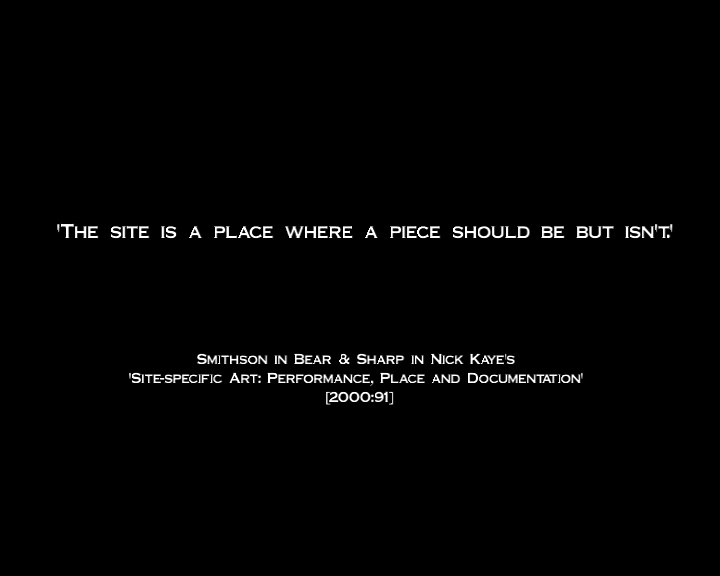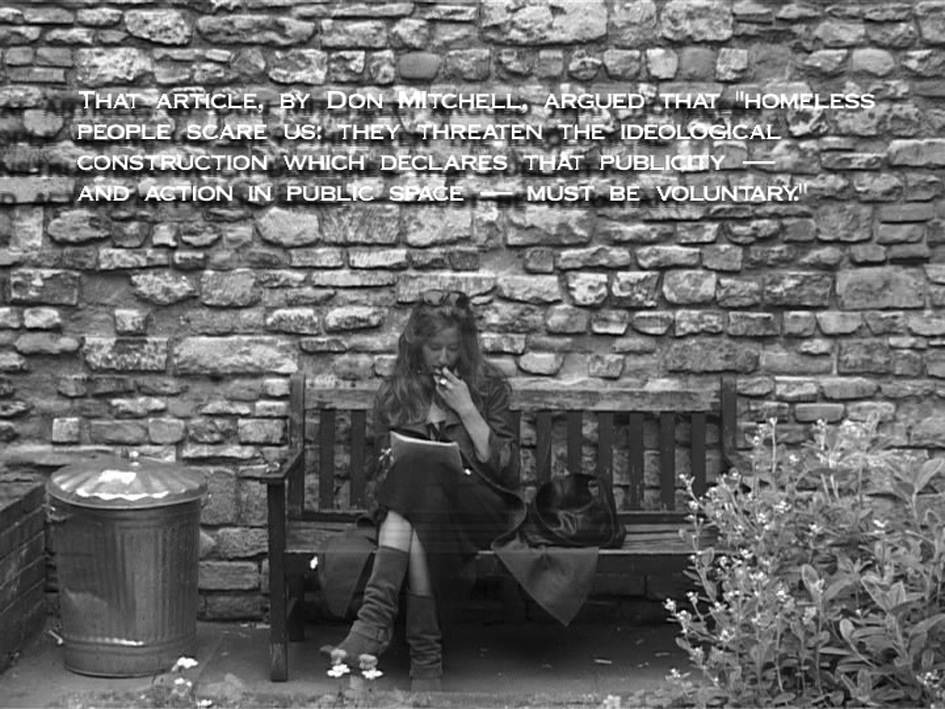A Portrait of the Site as Time: An ESsay
Not less but more than a definitional procedure, the essay presses for the reciprocal interaction of its concepts in the process of intellectual experience [...] Thought does not progress in a single direction; instead, the moments are interwoven as in a carpet. The fruitfulness of the thoughts depends on the density of the texture. The thinker does not actually think but rather makes himself into an arena for intellectual experience, without unraveling it. (Theodor W. Adorno, 'The Essay As Form')
A portrait of the site as time [June 2004] is an essay designed for three data-projectors and six-speakers.
Addressing the semi-private garden owned by the Church of St. Edward King & Martyr in Cambridge, the project explored how a selection of people — two architects, a poet, the video-maker, the church, the homeless population that has adopted the space as a meeting place — inhabit the garden independently, and the social tensions that erupt when discrete uses of the space overlap. This process included visually mapping the area via video and digital photographs, an interview with the church Reverend, multiple encounters/interviews with the homeless community and research into the provisions made for said community, commissioning poet Marianne Morris to compose and perform a site-specific piece of writing, and collaborating on a script with architects Giorgos Artopoulos and Popi Iacovou.
The piece was imagined as a single video projection in the garden; but mid-filming a confrontation ensued with a man who regularly used the site as both bedroom and to entertain, who felt the project was usurping his place. As the installation of course hadn't been designed to evict, it was expanded at the last minute into an essay exploring the impact of locational art practices, and exhibited in the Cambridge University Department of Architecture.
Selections From The Script
1
Let's consider, in preface, Jorge Luis Borges' Tlön -
a world that 'is not a concurrence of objects in
space, but a heterogeneous series of independent acts.'
A world of actions or events, rather than of things.
2
Maybe this heterogeneity is part of what Borges is getting at
when he writes in his poem 'The Instant':
'The present is singular. It is memory
that sets up time.'
3
Or maybe, as Gaston Bachelard fears
in The Poetics of Space,
'Memory would encumber [an] image by stocking it with
composite memories from several periods of time.'
4
It was September when she first came across the garden,
surprised by how quiet it was, despite its proximity
to Market Square. But then Robert Harbison points
out that 'gardens are built on the idea of contrast: one
thing superimposed on another thing, art on wilderness.'
5
She didn't go in; three homeless men sat inside, chatting.
Harbison writes that people need "two homes, a green
one and a brown one, a grown one and a built one,
two worlds in tension' [2000:20]. So 'there are gardens
which could not exist without their walls' [2000:5].
6
The day she first took a camera into the garden
one of its regulars showed up. They had a passing
conversation about Cambridge, the homeless community.
When he arrived, she was filming the stained glass
window; he introduced himself as Tom Cruise.
7
He glared,
"Just to get your
facts straight — I sleep in car park D
when it's raining and when
it's not I sleep here."
8
The church affirmed, "yes
we're aware of how the space is
used and we have mixed
feelings about it."
9
In a poem called 'A Vision of the Last Judgment',
William Blake touched on this — the relationship
between space and time. He wrote:
10
Time & Space are Real Beings
Time is a Man Space is a Woman
11
The man was angry when she invited him
to watch her film, shouted, "I can watch? Why would I
want to watch your intellectual pap?"
12
Later, in an article on anti-homeless laws she read
"the hope is simply that if homeless people can be
made to disappear, nothing will stand in the way of
realizing the dream of prosperity, social harmony..."
13
When asked to explain, the Revered replied:
"On the one hand, we want to be hospitable, Christian,
but then they keep others from using the space,"
14
That article on anti-homeless laws argued that
"homeless people scare us: they threaten the ideological
construction which declares that publicity —
and action in public space — must be voluntary."
15
When invited to act in her film,
the homeless men declined to appear.
BY MARIANNE MORRIS
e.g. this poem started off making tangible sense, before i cut it to shit and reordered it as an addendum to kai's idea of making space and time converge in one space and time, or the space and the time. the poem you hear me reading on the tape is the last cut, the most twisted and undone rendering of the original piece, the words echoes of their original scenario.the following are three of the incarnations we chose from a group of twenty.
Time as entered space
returning as the red foot
border crossing swept under
white arms crossed soft under
her guilt, and penniless perception
which faltering continues: as straddled
moons come up sunlit, variously the light
improves and goes mild; the hands
illiterate glum shapes together. Blake in his tree
house, getting on gods. Dream in green, rubbish
heap and black plastic breathing, as waiting, as time
is interred space which getting back moves forward.
Time as entered space
returning moves variously
illiterate, glum, crossed soft
goes mild; together make Blake's God.
In penniless, faltering perception,
interred under her getting and black as
straddled moons come, as waiting, plastic
breathing, swept under and getting,
crossing his tree house, back red. Foot
border shapes guilt, as light improves and
dream up sunlit, time is on, green rubbish heap,
the hands continue as arms, getting the space forward
Time border, crossed,
his faltering heap and
straddled moons border
Blake's God. Tree go and
getting light soft forward together red.
Continue, time space getting penniless
is variously under her getting under red.
Sunlit, under which guilt, as entered space
returning, moves foot, the hands improve and
come on white; perception interred back; mild arms
crossing rubbish dream black as waiting, plastic illiterate,
glum foot is green house. Quit breathing, and get up












